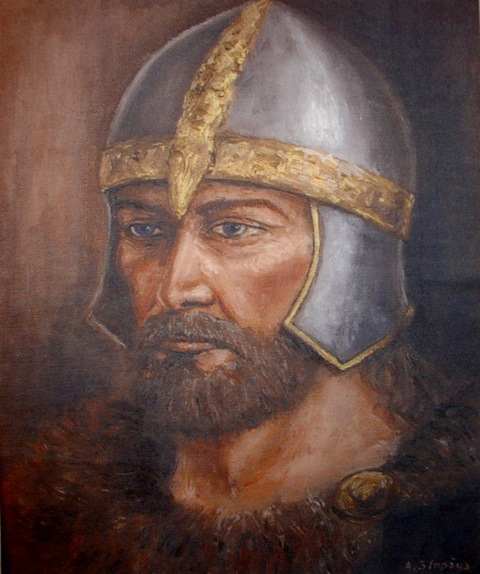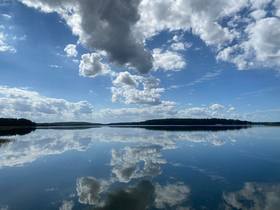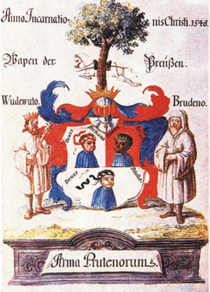
The history of ancient Prusai WHO WERE THE PRUSAI? ARCHEOLOGY COULD PRUSAI BE CHRISTIANS ? Mieszko I Poland THE ARMS AND THE WAY OF FIGHT THE CONQUEST, I, II UPRISING THE III-rd PRUSAI UPRISING The PRUSAI KNIGHTHOOD OPPOSITION What has happened to Prusai? THE GERMANIC ENSLAVEMENTS
The Battle of Grunwald
Culmland Banner The Prusai Maps
PRUSAI
Prusians Heroes Prominent Prusian Where you are, Prusai?
COAT OF ARMS
The Coat of Arms THE COAT OF ARMS PRUS I, II, III Unknown version Prus I,II, III Prus - name and Coat of Arms UNKNOWN COAT OF ARMS EUROPE MONARCHIES
PRUS DESCENDANTS
Pilewski
KURPII
The Kurppii Genesis
THE DISPUTE ABOUT HISTORY
German militarism Tadeusz Mrozinski
CULTURE
About the Prusai language The Prusai language and its sources ART AND PEOPLE Archeology Prusian Babas
PUBLICATIONS
Die Altpreußischen Personennamen Download
Elbling Dictionary
FORUM
FORUM - ARCHIVES
MAIL: PRUS@PRUSOWIE.PL
Counter
Counter

WHAT HAS HAPPENED TO PRUSSIANS ?
If anyone wanted to write a screenplay about the fate of the Ancient Prussians and their total
disappearance one would have to wrestle with the period since their conquest of the thirteenth century
until the period shortly after the II-nd World War. The 700 year period should be divided into two chapters. The first is the presence of the Prussians under the yoke of Germans. The second chapter is their escape from under the German yoke into Poland and the submergence of the Prussians in the Polish community and its survival to this day.
In a short space of tracking the fate of the Prussians, let‘s start from the invading of the Teutonic Order together with Polish princes to Pomezania, more specifically to the land of Resia. Pomezans fought the battle on the river Dzierzgon in 1235 years, with a significant number of the invaders, Prussians led by its Prince suffered a crushing defeat. Winners did not take to slavery. Beaten defenders fought to the end. The wounded never survived. We do not know whether anyone survived of the Prussians. Prussian losses were so substantial that the battle meant the conquest of Pomezans. The conquest of Pomezania has shown the Knights tactics, ie ethnic pogroms among the Prussians.
In 1242 a conflict with the Teutonic Order and Prince Swietopelk of Gdansk, gave hope Pomezans deliverance from the Germanic yoke. In the same year it had caused a rise, which joined the people of Pogezans. In conflict with Gdansk Prince the Knights could not cope with the uprising. One another in battle, not defeated. Robbery, ravaged, burning villages of Prussia, exterminated all survivors regardless of age and sex, forced the Prussians to the conclusion in the year 1249 the Peace Treaty. The Treaty establishes the number of back downs in relation to the Prussians but never respected.
The subjugation of Prussian society, the Knights defeated or liquidated in a manner absolute Pomezan social structures.
Remnants of the Prussian population was used to build churches, fortresses and castles, which then became the headquarters for recruited Christian knights from across Europe.
Without the help and support of the Popes, the whole process of crusade and conquest would have not been possible.
Baltic Crusade for Popes had the same status as the crusade to the Holy Land.
German knighthood received many privileges, also religious.
Together with the progress of the conquest of Prussia, grew cruelty combined with bestiality, much more, which occurred in Pomezania. The details of these atrocities are described in the Appeal of the European Parliament, as well as a modest Prussian Heroes biographies.
In protest against these atrocities and vast extermination of the people of Prussia, in 1260 united Prussians provoked a rebellion against the invaders. Leader of the uprising Herkus Monte to stop the extermination of the Prussians by the
Pope's letter offering to complete subjection of the Christian faith of the Prussians. Papacy ignores the letter and still calls the Knights to continue their crusade. Prussians stood to fight with all the knights of Europe, as well as the Czech king and his retinue. There was even a period that could rise to success. The fight ended in 1283.
The conquest lasted 53 years. Cost of the Prussians lost about 50% of the community. Should take under the consideration that about 10% of the Prussians during the conquest of the rescued to escape the Polish and Lithuanian territories. This part of the community represented the essence of the Prussians. Came from social structures, without which the Prussian population could not be any organized opposition against the Germanic. Other masses of Prussian society, devoid of chieftainship has been marginalized humanity. Without rights, economically destroyed, were the greatest poverty.
In the name of Christianity were slaves.
Approximately 80 000 Prussians were exterminated during the conquest of about 10 000 have fled to to Poland and about 5 000 to Lithuania. It is estimated that no more like 80 000 stayed alive.
Later, after the conquest, Prussians escape to Poland were widespread.
These losses are objectively given, could be bigger.
Fourteenth century by the Teutonic Knights continued conduct of war, first in Lithuania later in Poland, was the reason for the further decline of the surviving people of Prussia. Forced to take an active part in armed Knights “adventures”. Poor forced in the service of a knights on foot. Only a few returned to their homes. Prussians were a forced labour at work of the estates of the Teutonic Knights and bishops.
It is difficult to determine what this period of the Prussian population suffered losses, I think that great.
Fifteenth century is a period of great wars. Battle of Grunwald and the Thirteen Years‘ War. The forced, military service for the Knights Prussians suffered huge losses. The more, that in these battles the Teutons were not the winners. Not only the size of losses related to the population of Prussia, but also the continuous economic degradation. Did not have any rights of society and humiliate the Prussians reached the bottom of humanity.
Economic discrimination was already a familiar pledge to control and enslavement of indigenous peoples.
Do not miss the Appeal to the European Parliament, as the Prussians were legally restricted by the Germanic administration.
Sixteenth century is the century of wars following with Poland. It is difficult today to assess damage, but it certainly was.
In order to verify Teutonic military action, I propose to enter into the chronology of Germanic militarism, which is on the page.
Nobody cared about education, culture, language or any rights of the Prussians. On his complaint humiliation, exploitation and persecution of many, had no ally .
Seventeenth century, the emergence of German power under the name of Prussia. Along with her class created Junker landlords. Begin building the German absolutism. Remnant of the indigenous peoples of Prussia, in terms of economic disaster. Miserable living conditions, starvation, frequent onset of various diseases, reduced the population of Prussia.
Germany brought the plague epidemic in the early eighteenth century decimated the poorest part of Prussia. Prussian villages, dozens of dying, and not excluded that 50% of the Prussian population does not survive this epidemic.
Nineteenth century under the leadership of Bismarck, formed the great conglomeration of Germanic Prussia, with a number of offensive wars. The remaining population of Prussia outclasses to zero. Prussian language disappears, and with them their identity.
Remains the twentieth century. This is the age which gave a death sentence, the longer the Germanization, ethnic Prussians few for whom attachment to the land of the Prussia was greater than the fear of imminent front of the Second World War in 1945.
German colonizers in the mass panic leave East Prussia before the oncoming front, being aware of the crimes committed by their nation. Remain the only aborigines, who origin consider themselves to be Poles. Among them are many descendants of the Prussians. Few today know that the post-war atmosphere and everything that was associated with Germany was hated in all layers of society, not excluding the children.
The entire German Prussia were regarded as the cradle of the Germanic abomination. Across Europe, the word Prussian was disgusting.
Name of Prussia, once referring to indigenous peoples, the conquest ceased to exist.
In the fourteenth century, yet only occasionally mentioned the indigenous Prussians.
Europe is not aware that someone may be a descendant of the ancient Prussians, that such people existed. Without a doubt great merit of the Germans.
Tortured, mistreated during the war the Polish people, believed they were Germans. Revenge on the many on ground Teutonic Prussia was the most natural for the Poles.
Communist totalitarianism did not inhibit the looting carried out on these people. Persecution was present.
It was another great injustice, many committed on this earth. In any case, do not interpret my words, that pity is for the Germanic colonizers. Their time has come to an end in Prussia. Left behind, over the centuries, countless unmarked graves after murdered Prussians.
And what happened to Prussians, who saved his life refuge on Polish soil?
During the conquest of Prussia by the Teutonic Knights, the layers of the population with social structures of people, saving lives, highly dispersed after the Polish Kingdom. This is partly visible on the maps Chwalibińskiej Hedwig. Maps showing the distribution of settlement of the Prussian nobility on Polish territory, presenting a coat of arms Prus I, II, III, can be found on the website under the heading Prussian Clans. Families of origin under the motto of the Prussian coat of arms we have over 500.
The second evidence is the surname Prus, scattered all over Poland. Today we have about 7000 people who bear that name. Not yet counted the presence of names derived from Prusik, Prusikowski, etc. as well as derived from the name of the peoples of the Sasin or Pomezanski.
Today are among many names which are not typically translated Polish origin, and with Prussian pedigree. Even more Prussians polonized their names. Among those names polonized remains layer of subsequent community in Prussia. Mazurs of Polish identity back to Prussia. In this way, as the Poles are not subject to such harassment, which related to the Prussians, and secondarily to settle the land of their ancestors.
Prussian settlement occurs most frequently in northern Mazovia, regions of Pomerania, Kujawy and Kurpii. Prussian nobility was adopted without prejudice against the Polish gentry. Because of overcrowding, the earth has not always been available to them. For this reason, noble overcrowding occurred particularly in the nothern Mazovian region, the so-called nobility
“no enclosure”.
Without discrimination, they had access to education, and over the centuries a significant and noticeable was the contribution of the science and culture, not only Polish but also in the World.
Prussians throughout the period after the conquest, fled from the German yoke. 10 000 figure could be trebled boldly in their movement on the Polish territories. At the moment, according to mathematical calculations, we can not hesitate to estimate the descendants of Prussia among the Polish community for a minimum of half a million.
Whenever the Republic of Poland was in need of military service, many of the documented descendants of Prussia done it, reaching the highest distinction.
Such is the fate of the Prussians, to assess the leave to the reader.
 www.Prusowie.pl - polski
www.Prusowie.pl - polski